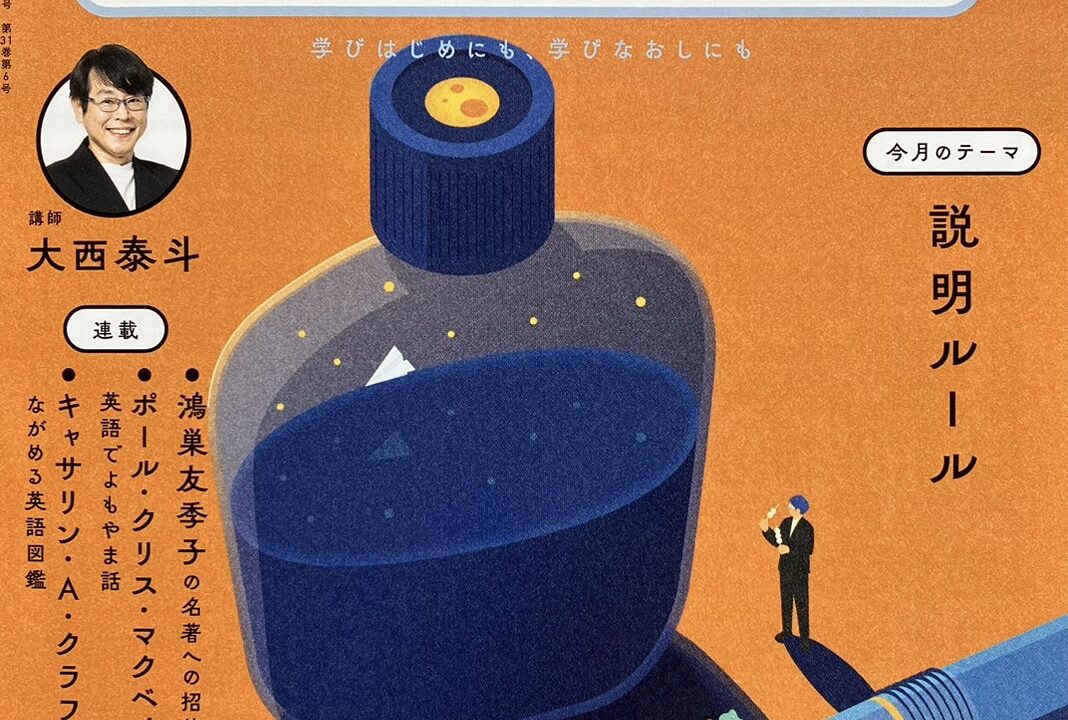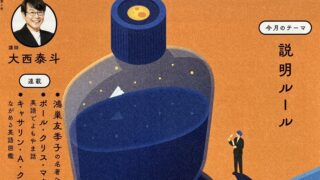【ラジオ英会話】Lesson 109 動詞句修飾④ – 過去分詞で説明 – September 12 Thursday, 2024

September 12 Thursday, 2024
Lesson 109 動詞句修飾④ – 過去分詞で説明
☆Words & Phrases
**awesome:
It’s awesome to meet you, Stacy. I’m Derek Simmons.
D: “Awesome” is a little over the top for an introduction, but Derek is a rocker, so it’s okay here.
**introduce oneself:
**famous:
You don’t need to introduce yourself. You’re famous.
**among:
**speaking of~:
Well, among bass players maybe. Speaking of bass players, how was Paul on his last day?

**disappointed:
He left the band a bit disappointed.
**farewell speech:
Well, he was expecting Bill to make a farewell speech…but Bill didn’t.
**hate:
Ah, yeah. Bill hates long goodbyes.
☆Grammar and Vocabulary
He was expecting Bill to make a farewell speech.
to不定詞を説明語句に用いた目的語説明型(SVOC)
to不定詞に矢印(→)のイメージがあり、目的語がto以下の状況に進むことが示されている。
この文は「Bill が make a farewell speech に進むことを was expecting(期待していた)」ということ。
Bill hates long goodbyes.
現在形
現在形は「広く一般的な内容」を表すのが得意な形。この文でBillは長い別れが「ふだんから・習慣的に嫌い」なのである。
long goodbyes と限定詞(a, the)がないのは「長い別れのあいさつを含むそうした状況 (一般)」を示している。

☆Target Forms
He left the band a bit disappointed.
過去分詞は受動(~される)の意味関係を表す形。
disappoint は「がっかりさせる」であるため、過去分詞 disappointed は「がっかりさせられる → がっかりする」となる。
過去分詞も動詞(句)の後ろに置けば、その説明になる。
この文は left the band の様子を a bit disappointed が説明しており、「少しがっかりしてバンドを去った」となる。
Practice
過去分詞に「~される」と受動の意味があることを意識しながら、left the band の後ろに続けます。後ろに置けば説明になる――シンプルですね。
left the band
↓
left the band a bit disappointed
↓
He left the band a bit disappointed.
① We got home exhausted.
→ exhausted は「疲れ切って」。exhaust(疲れ果てさせる)の過去分詞
② I woke up rejuvenated.
→ woke up の様子を rejuvenated(元気を取り戻して)が説明している
③ He arrived excited to see me.
→ arrived の内容を excited 以下で説明
★Practice
D: Practice, practice, practice! That’s what they say. Let’s keep it up with after the「動詞句」, extra information after the「動詞句」. All right? Let’s go!
R: Okay guys. Let’s begin,
– got home exhausted
– We got home exhausted.
D: Great job. Let’s keep going!
– woke up rejuvenated
– I woke up rejuvenated.
R: And one more,
– arrived excited to see me
– He arrived excited to see me.
D: Unlock your potential.
R: Repetition is the key!
D&R: Great work.
☆Grammar in Action
①今朝、疲れ切って目覚めました。まったく眠っていないように感じます。
**drain:
**feel like ~:
②私たちは、フラストレーションがたまったままミーティングをあとにしました。何も私たちが計画したとおりに進みませんでした。
**leave:
**frustrated:
③私は、誕生日を友人と家族に囲まれて過ごしました。完璧な一日でした。
**surround:
★Ending
D: It’s great to be with the people that you care about for your birthday.
R: Well, for me it’s being surrounded by animals.
September 12 Thursday, 2024
Lesson 109 動詞句修飾④ – 過去分詞で説明
(日本語訳・解説付き)
☆Words & Phrases
**awesome: すばらしい
It’s awesome to meet you, Stacy. I’m Derek Simmons.
お会いできてとてもうれしいです、ステイシー。僕はデレク・シモンズです。
D: “Awesome” is a little over the top for an introduction, but Derek is a rocker, so it’s okay here.
“Awesome” は挨拶としては少し大げさだけど、Derekはロッカーだから、ここでは問題ないよ。
※awesomeは「素晴らしい」という非常に強調度の高い表現で、初対面の挨拶にはちょっと行きすぎな表現です💦でも、デレクはロッカーだからOKですね!
**introduce oneself: 自己紹介をする
**famous: 有名な、名だたる
You don’t need to introduce yourself. You’re famous.
あなたが自己紹介をする必要なんてないわ。有名なんですから。
**among:(雑多な集団の)中の、間の ※前置詞
**speaking of~: ~と言えば
Well, among bass players maybe. Speaking of bass players, how was Paul on his last day?
でも、それはたぶん、ベース奏者の間での話です。ベース奏者と言えば、最後の日のポールはどうでしたか?

**disappointed: 失望して
He left the band a bit disappointed.
少しがっかりしてバンドを去っていきました。
**farewell speech: 送別のスピーチ
Well, he was expecting Bill to make a farewell speech…but Bill didn’t.
ええと、彼は、ビルがお別れのスピーチをしてくれることを期待していたんです…でもビルはしなかったから。
**hate: ~することを嫌がる、~するのはいやだ、~したがらない
Ah, yeah. Bill hates long goodbyes.
ああ、まあそうだね。ビルは長い別れが嫌いですからね。
☆Grammar and Vocabulary
He was expecting Bill to make a farewell speech.
彼は、ビルがお別れのスピーチをすることを期待していました。
to不定詞を説明語句に用いた目的語説明型(SVOC)
to不定詞に矢印(→)のイメージがあり、目的語がto以下の状況に進むことが示されている。
この文は「Bill が make a farewell speech に進むことを was expecting(期待していた)」ということ。
Bill hates long goodbyes.
ビルは長い別れが嫌いです。
現在形
現在形は「広く一般的な内容」を表すのが得意な形。この文でBillは長い別れが「ふだんから・習慣的に嫌い」なのである。
long goodbyes と限定詞(a, the)がないのは「長い別れのあいさつを含むそうした状況 (一般)」を示している。

☆Target Forms
He left the band a bit disappointed.
彼は、少しがっかりしてバンドを去りました。
過去分詞は受動(~される)の意味関係を表す形。
disappoint は「がっかりさせる」であるため、過去分詞 disappointed は「がっかりさせられる → がっかりする」となる。
過去分詞も動詞(句)の後ろに置けば、その説明になる。
この文は left the band の様子を a bit disappointed が説明しており、「少しがっかりしてバンドを去った」となる。
Practice
過去分詞に「~される」と受動の意味があることを意識しながら、left the band の後ろに続けます。後ろに置けば説明になる――シンプルですね。
left the band
↓
left the band a bit disappointed
↓
He left the band a bit disappointed.
① We got home exhausted.
私たちは、疲れ切って家に着きました。
→ exhausted は「疲れ切って」。exhaust(疲れ果てさせる)の過去分詞
② I woke up rejuvenated.
私は、元気を回復して目覚めました。
→ woke up の様子を rejuvenated(元気を取り戻して)が説明している
③ He arrived excited to see me.
彼は、私と会うのでウキウキしながら到着しました。
→ arrived の内容を excited 以下で説明
★Practice
D: Practice, practice, practice! That’s what they say. Let’s keep it up with after the「動詞句」, extra information after the「動詞句」. All right? Let’s go!
R: Okay guys. Let’s begin,
– got home exhausted
– We got home exhausted.
D: Great job. Let’s keep going!
– woke up rejuvenated
– I woke up rejuvenated.
R: And one more,
– arrived excited to see me
– He arrived excited to see me.
D: Unlock your potential.
R: Repetition is the key!
D&R: Great work.
☆Grammar in Action
①今朝、疲れ切って目覚めました。まったく眠っていないように感じます。
I woke up drained this morning. I feel like I didn’t sleep at all.
**drain: 水を抜く、疲れさせる
**feel like ~: ~のように感じる
②私たちは、フラストレーションがたまったままミーティングをあとにしました。何も私たちが計画したとおりに進みませんでした。
We left the meeting frustrated. Nothing went the way we planned.
**leave: 去る、あとにする
**frustrated: 不満を持って
③私は、誕生日を友人と家族に囲まれて過ごしました。完璧な一日でした。
I spent my birthday surrounded by friends and family. It was the perfect day.
**surround:(人や物を)取り囲む、周りを囲む
★Ending
D: It’s great to be with the people that you care about for your birthday.
誕生日は、大切な人たちと一緒にいるのが一番だよね。
R: Well, for me it’s being surrounded by animals.
私の場合は、動物に囲まれていることが一番だけどね。
名古屋駅前にあるビジネス英語&仕事での英語雑談力をつけるための「名古屋BEGビジネス英会話ジム」
営業時間:平日 9:00~22:00 土曜日 9:00~19:00(日祝休み)
〒450-0002 愛知県名古屋市中村区名駅2丁目40-16 名駅野村ビル 5階



